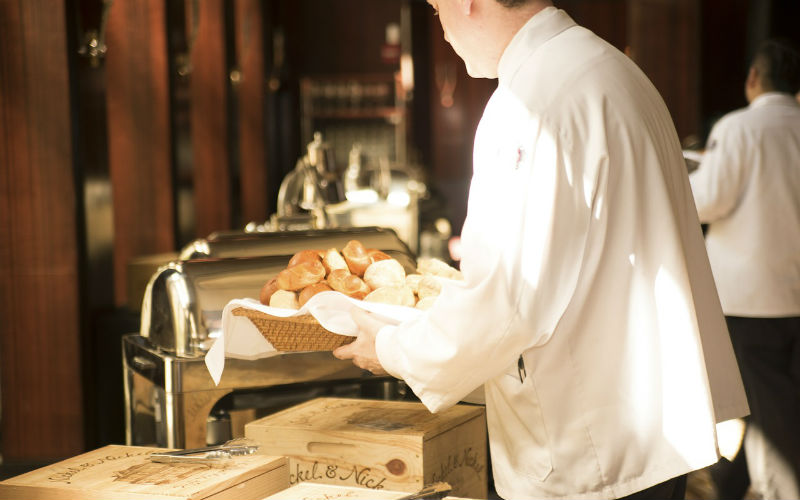
By Lindsay Street, Statehouse correspondent | A tightening labor pool and declining wages could spell trouble for one of the state’s biggest economic engines: hospitality.
“It’s almost in a crisis stage that we can’t fill all of the positions available,” said Linn Lesesne, co-owner of Charming Inns, a small business comprising four inns and two restaurants in Charleston. “We’re constantly looking for front desk and housekeeping and line cooks, we always have positions available.”
Lesesne isn’t alone. In fact, in her role as chair of the Charleston Convention and Visitors Bureau’s board of governors, she spoke Wednesday on this topic to other hospitality business owners.
“Everybody across the city is feeling it,” she said, adding one of her restaurants has seven job openings. “The Convention and Visitors Bureau has been in the business of marketing the city and now we are recognizing there is so much more to that … We can build beautiful hotels but if we don’t have staff that are friendly and genuine and willing to work hard, then those places are not going to succeed and the city’s not going to succeed.”
The problem
Worker shortages are happening across industries in the state, from the public sector to manufacturing.
In April, South Carolina’s jobless rate declined to 4.0 percent from 4.2 percent the previous month — meaning 5,431 people found more jobs, according to recent numbers from the S.C. Department of Employment and Workforce. But the number of people in the workforce also declined overall by 5,431.
“We can complain about (the tight labor force) but it’s kind of like complaining about it being hot in Charleston. It’s kind of how things are,” said Calvin Blackwell, chair of College of Charleston’s Department of Economics.
Blackwell said there is a cure for any industry struggling to recruit and retain: better incentives, including paying workers more.
The wage issue
Blackwell fingered low wages as an issue adding to worker-shortage woes for hospitality.
Hospitality workers are among those being paid less than 10 years prior when adjusted for inflation, according to a DEW 2017 report. In January 2007, the average private-service providing industry earnings was reported at $19.16 per hour. In June 2017, the average wage was $18.23 per hour.
As wages declined, the demand for workers has increased. State data show the hospitality workforce grew by 9.5 percent in 2014-2015 and 8.2 percent in 2015-2016, placing the industry among the top in growth in the state.
Blackwell said in comparison to other sectors, hospitality wages “tend to be fairly low.” He cited a $12.50 per hour wage for cooks in Charleston. Data from the Charleston Regional Development Alliance found the average hourly wage in 2016 was $10.75 for food preparation and serving-related occupations — the lowest among all occupations listed.
“In a well-functioning market, we would expect a (worker) shortage to be addressed by a price increase, but that price increase is happening pretty minimally at this point,” Blackwell said. “Incentives matter here and so my advice to the industry is if you’re having trouble finding people you’re going to have to provide more incentives for them to come work for you … That’s what happens when you have a tight labor market.”
Assuming the worker is full-time at 40 hours per week at $10.75 an hour and takes two weeks of vacation, that amounts to $21,500 per year before taxes. That is less than 200 percent of the federal poverty level for a single person. In Charleston County, for example, that would leave about $500 a month for living expenses after renting a one- or two-bedroom home for about $1,200.
Lesesne agreed wages are an issue for recruiting and retaining employees.
“It’s on top of mind,” she said. “Charleston is not an inexpensive place to live.”
But economists and business owners alike agree: wages aren’t the only solution.
More solutions on horizon

Lesesne said one way the Charleston Visitors and Convention Bureau has helped alleviate the crisis has been with regional job fairs, which offer jobs where people work.
Two other “out-of-the-box” solutions in the works have included reaching out to former residents of OneEighty Place, a homeless shelter in the Charleston area, and to veterans , and the region partnering with local governments to provide parking and transportation for workers, Lesesne said.
“We are headed in the right direction,” Lesesne said. “We’re coming up with solutions; they’re just a work in progress.”
Other perks, like health insurance, can also draw employees back to the industry, Blackwell said.
‘Keeping employees happy’
In Columbia, University of South Carolina School of Hotel Restaurant and Tourism Management Director Drew Martin is conducting research on hospitality worker recruitment and retainment and he said a different kind of incentive could help.
“I have a working hypothesis that the key to attracting and retaining employees for these positions requires building a culture of shared values,” Martin said. “Basically, people want to feel important and recognized for their accomplishments.”
Martin said his research piggybacks off of research from nearly 100 years ago in the 1920s and 1930s that showed employees performed better when they have a more-friendly work environment.
“Keeping employees happy is far better than training new people,” Martin said. He said that the Association of Talent Development estimates small businesses spend nearly $1,900 on training per new employee.
A friendly corporate culture is important to Lesesne and her employee retention.
“We care about our employees. We make sure nobody misses award day at school. Family comes first,” she said, adding she knows all of her employees’ names and is on a friendly basis with them.
Martin said businesses like Lesesne’s will have to continue to add more solutions to stave off a worsening crisis.
“Paying people more would be nice, but this option is not always possible,” Martin said. “(However) I still argue that paying a bit more for quality help probably is better than alienating customers and ruining the business’s reputation.”
- Have a comment? Send to: feedback@statehousereport.com
















 We Can Do Better, South Carolina!
We Can Do Better, South Carolina!
Pingback: June beats expectations with 213,000 new payroll jobs, unemployment at 4 percent